Cancer patients face ‘death sentence’ in Yemen
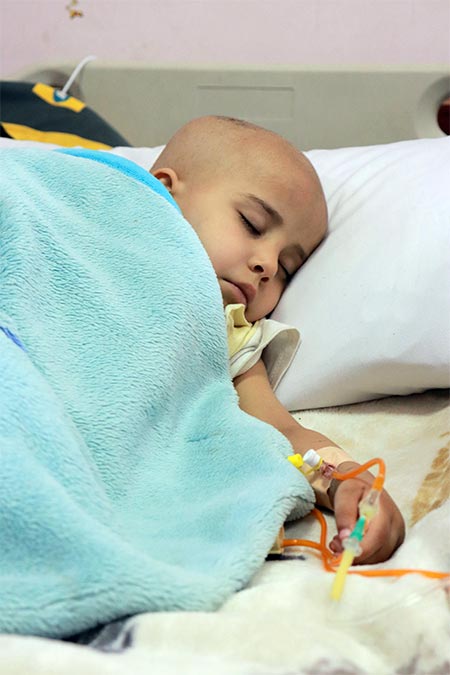 Layan was finally able to sleep after crying from the pain of the cannula that has been attached in her hand for days4 February 2019 – “Mum, it hurts very much.” With tears in her eyes, 4-year-old Layan describes to her mother how she feels about the cannula that has been in her hand for days.
Layan was finally able to sleep after crying from the pain of the cannula that has been attached in her hand for days4 February 2019 – “Mum, it hurts very much.” With tears in her eyes, 4-year-old Layan describes to her mother how she feels about the cannula that has been in her hand for days.
Layan was diagnosed with non-Hodgkin lymphoma – a type of cancer that affects the lymphatic system – in March 2018. “When we admitted Layan to hospital, there were no empty beds and we had to wait for days until she was finally able to receive treatment. My heart aches and no words can describe how I feel seeing my little daughter endure the pain of illness,” says Abeer, Layan’s mother.
Mohammed Ahmed, 3-and-a-half years old, suffers from kidney cancer. With a beautiful, heart-capturing smile, he tells the doctor that he wants to go home. So far, Mohammed has had 6 chemotherapy sessions over 8 months and is scheduled for 2 more in the coming months. Mohammed’s family is trying to move from Ibb to Sana’a to avoid the high cost of transportation.
Providing urgent health care to millions: WHO and the Italian Agency for Development Cooperation work together to reach the most vulnerable
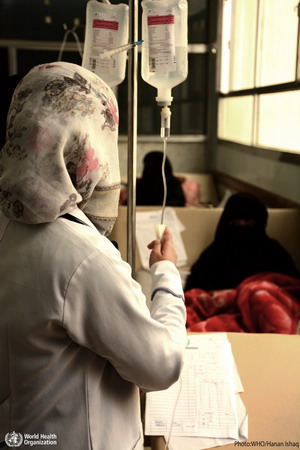 24 January 2019, Sana’a, Yemen — With a generous donation of 2 million euros from the Italian Agency for Development Cooperation, the World Health Organization (WHO) is scaling up efforts to meet health needs in Yemen through the health service delivery mechanism known as the Minimum Service Package. This is the first time since the start of the crisis in Yemen that WHO has partnered with the Agency.
24 January 2019, Sana’a, Yemen — With a generous donation of 2 million euros from the Italian Agency for Development Cooperation, the World Health Organization (WHO) is scaling up efforts to meet health needs in Yemen through the health service delivery mechanism known as the Minimum Service Package. This is the first time since the start of the crisis in Yemen that WHO has partnered with the Agency.
This critical support will allow WHO to reach more than 600 000 of the most vulnerable people in need of essential health services in hard-to-reach areas of Al Hudaydah, Amanat Al-Asimah and Hajjah governorates. The objective is to provide health services through the Minimum Service Package while strengthening the health system with support from health partners across the entire country, ensuring the “right to health” for all Yemenis.
Cholera and malnutrition in Yemen threatens millions
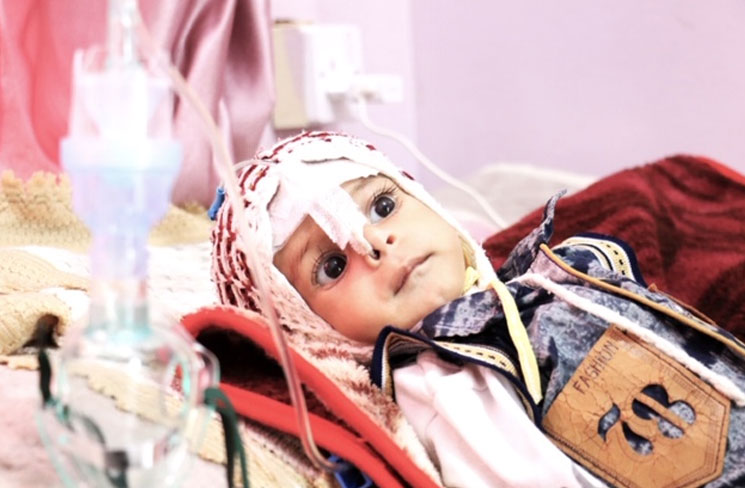 27 December 2018 ─ Al Sabeen Hospital in Sana’a has admitted many cholera patients over the last 2 years, including infants as young as 2 months. Many of them also suffer from acute malnutrition. At the peak of the cholera outbreak more than 150 patients a day were being admitted to Al Sabeen hospital with severe watery diarrhoea. Some 20% of the total were diagnosed with cholera.
27 December 2018 ─ Al Sabeen Hospital in Sana’a has admitted many cholera patients over the last 2 years, including infants as young as 2 months. Many of them also suffer from acute malnutrition. At the peak of the cholera outbreak more than 150 patients a day were being admitted to Al Sabeen hospital with severe watery diarrhoea. Some 20% of the total were diagnosed with cholera.
Two-and-a-half-year-old Ramez and eight-month-old Mohamed are brothers. Small and frail, they have been diagnosed with cholera and are moderately malnourished.
Their family moved from Hajjah to Sana’a after their father lost his job.
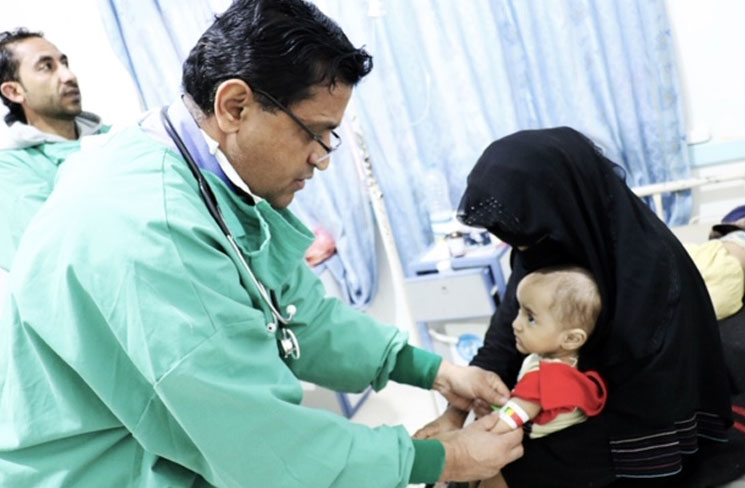 “In Hajjah we used to drink pure water from wells,” says the boys’ mother, “but after moving to Sana’a we had to drink from water trucks.”
“In Hajjah we used to drink pure water from wells,” says the boys’ mother, “but after moving to Sana’a we had to drink from water trucks.”
It is almost 4 years since war erupted in Yemen, with devastating consequences for the country’s infrastructure and health system.
Despite ongoing humanitarian food assistance the latest IPC analysis - covering December 2018 to January 2019 - revealed 15.9 million people (53% of the population) faced food shortages. Of these, 17% of the population - about 5 million people - are classified as IPC Phase 4 (Emergency), and 36% - 10.8 million people - as IPC Phase 3 (Crisis).
Like millions of Yemenis, Ramez and Mohammed’s parents face a constant struggle to access healthcare, pay rent and feed their children.
“I have 3 more children. Their father is looking after them at home,” says the boys’ mother.
Within minutes she receives a phone call from her husband who tells her the children at home are starting to show signs of infection. They agree he should bring them to the hospital straight away.
Abdulmajeed Yahya is 8-months-old and weighs a little over 3 kilograms. He has been severely malnourished for over a month. He was diagnosed with cholera at Al Sabeen Hospital seven days ago, after making the 5 hour journey to Sana’a from Al Haymaharea with his mother and father.
“My husband lost his job after the war started and is now unemployed. We had to borrow money so we could come here from Al Haymaharea,” says Abdulmajeed’s mother.
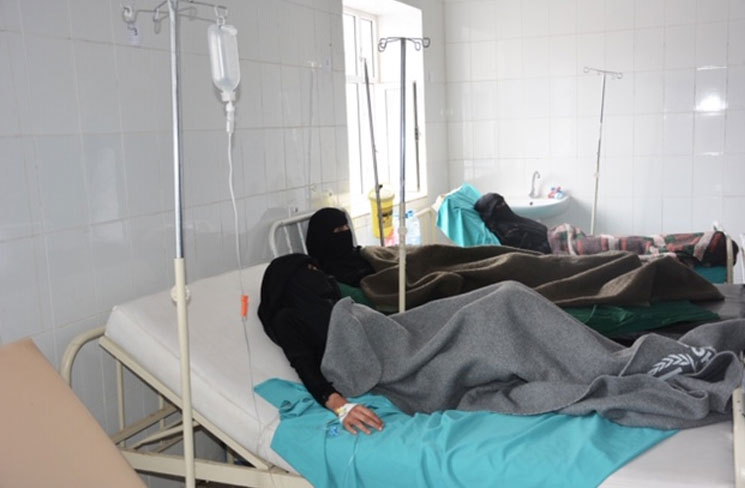 Sana’a’s 22 May Hospital treats many internally displaced families. It, too, sees large numbers of patients with symptoms of cholera and children suffering medical complications as a result of malnutrition.
Sana’a’s 22 May Hospital treats many internally displaced families. It, too, sees large numbers of patients with symptoms of cholera and children suffering medical complications as a result of malnutrition.
“We see two new patients suffering from cholera and malnutrition a day, many of them from families who own close to nothing. The hospital cannot accommodate in-patients so cases suffering from severe acute malnutrition with medical complications have to be referred to other hospitals,” says Suha Abdeen, a nurse on the hospital’s nutrition ward.
Jameel Moanis is 12-months-old and weighs just 3 kilograms. He was brought to 22 May Hospital a few days ago from Al Hudaydah and had to be referred to another hospital for more specialized treatment.
To help severely malnourished children suffering from medical complications WHO supports 269 health facilities in Yemen and has established 51 therapeutic feeding centres in 17 governorates. WHO has also established 72 diarrhoeal treatment centres and 25 oral rehydration centres for the treatment of cholera and other diarrhoeal diseases.
WHO works closely with the Ministry of Health and WASH cluster partners to contain cholera outbreaks, offering technical and logistical support to strengthen disease surveillance, assist diarrhoeal treatment and oral rehydration centres, train health workers on case management, deploy rapid response teams and improve sanitation and access to safe water.
There have been 280 198 suspected cases of cholera since the beginning of 2018, and 372 associated deaths. Children under 5 account fort 32% of the total suspected cases. Cholera has been reported in 22 out of Yemen’s 23 governorates, and 306 out of the country’s 333 districts.
WHO enhances access to basic health care in Yemen
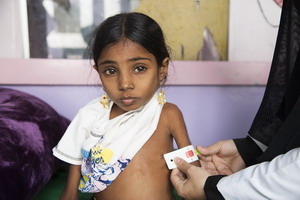 Seven-year-old Afaf travels more than 100 km of difficult roads to receive treatment for severe acute malnutrition17 December 2018 – Afaf, 7, has come to Aslam district to Al Jumhouri Hospital in Hajjah governorate, Yemen, a journey of more than a 100 km over difficult roads, to receive treatment for severe acute malnutrition and other problems.
Seven-year-old Afaf travels more than 100 km of difficult roads to receive treatment for severe acute malnutrition17 December 2018 – Afaf, 7, has come to Aslam district to Al Jumhouri Hospital in Hajjah governorate, Yemen, a journey of more than a 100 km over difficult roads, to receive treatment for severe acute malnutrition and other problems.
“When we have money to seek medical care we take her to the hospital, but when we don’t she must stay at home until she recovers on her own,” said Um Afaf.
In the same hospital is Nabila Yahya. She has come from Al Shaghadira District with her six-week old daughter Amira.
“My husband is ill,” says Nabila, “and cannot find a job. He used to work as a taxi driver but then the price of fuel doubled and he could longer afford it. Now he stays home.”
Amira has been sick since she was born.
“Something is wrong with her throat and she can’t breastfeed. She suffered from diarrhoea and we took her to the health facility many times. Each time they released her she became ill again and had to be returned for further medical care,” says Amira’s mother.
“She has been in this health facility for a week now. She was admitted as an inpatient and they are treating her well.”
Around 50% of hospitals and health facilities in Yemen are either not working or functioning partially. People in many areas have to travel long distances in order to access basic health care.
To enhance access to health care for people who would otherwise have to travel hundreds of kilometres to receive treatment WHO and health partners support the Minimum Service Package (MSP) which focuses on eight priority health care services, targeting health facilities at the district level.
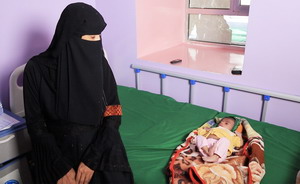 Nabila Yahya at Al Jumhouri Hospital with her six week old daughter AmiraThe MSP touches the lives of over 6.5 million Yemenis. It supports an estimated 125 health facilities and more than 2600 health care workers across the country. As MSP continues to expand, the hope is that more men, women and children will be treated.
Nabila Yahya at Al Jumhouri Hospital with her six week old daughter AmiraThe MSP touches the lives of over 6.5 million Yemenis. It supports an estimated 125 health facilities and more than 2600 health care workers across the country. As MSP continues to expand, the hope is that more men, women and children will be treated.
Economic collapse, poverty and a lack of services have left a great many people vulnerable. They must struggle to survive, often in communities that have little awareness of health and preventive practices.
Ismail Mohammed lies in his mother’s arms in an MSP supported health facility in Al Mahabisha District of Hajjah Governorate. He bled heavily following his circumcision and is severely malnourished.
“Every time he used to breastfeed he would get diarrhoea. So we brought him to this health facility where he was tested. They said he had infections and provided him with therapeutic milk,” says Ismail’s mother.
Access to health care for all
Six-month old Yousra was brought to the MSP supported Al Shaheed Hospital in Khairan Al Muharaq. Severely malnourished and excruciatingly frail – she weighs just 3 kilograms – she cries constantly. Her father sits on the hospital floor with his second child next to him while his wife speaks to the doctor. They both seem disoriented and unsure what is wrong with their child.
“She has had a fever for over three weeks. Yousra’s father is unemployed and we have nothing and no one to support us,” says Yousra’s mother.
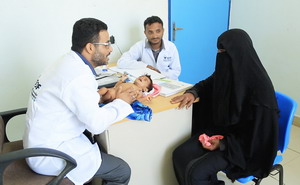 Six month old Yousra weighs 3 kg. She arrived at Al Shaheed hospital severely malnourishedAl Shaheed hospital’s Dr Ali Al Ashwal says severe acute malnutrition with medical complications, as well as communicable diseases, are spreading in communities.
Six month old Yousra weighs 3 kg. She arrived at Al Shaheed hospital severely malnourishedAl Shaheed hospital’s Dr Ali Al Ashwal says severe acute malnutrition with medical complications, as well as communicable diseases, are spreading in communities.
“Due to lack of resources and poverty families like Yousra’s are forced to use whatever means they can find to feed their children,” he says.
Yousra has been fed goat milk since birth. Dr Ali advises her parents she needs to be admitted for at least two weeks. She will be referred to Abs Health Centre where capacity for inpatients is available. It is an hour away from Al Shaheed hospital.
“We lack a therapeutic feeding centre with inpatient capacity here though we hope to be able to provide one soon.”
MSP provides essential services in health centres, covering nutrition, noncommunicable diseases and environmental health, trauma care, childcare, reproductive, maternal, newborn and child health. It aims to provide access to health care at all levels, targeting priority health needs and recalibrating an unbalanced health system.
With the generous support of our donors, including the World Bank, the Office of U.S. Foreign Disaster Assistance, Saudi Arabia, United Arab Emirates, Germany, Italy, Japan, EU Humanitarian Aid (ECHO), and Kuwait, we are working to ensure universal health coverage becomes a reality.








